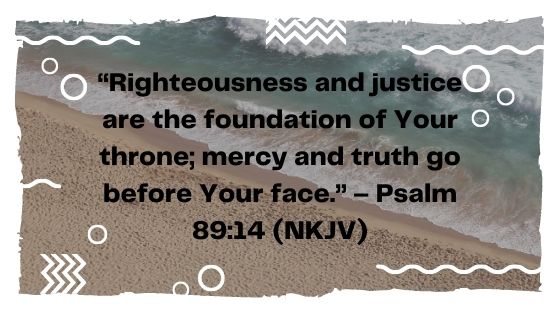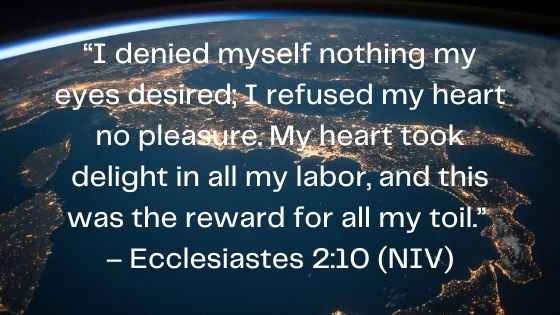Psalm 101 is said to be written by King David shortly after he ascended the throne. Needless to say, Israel’s confusions and abuses in the hands of Saul had to be reformed. Thus, David felt that he was God’s administrator and pledges his commitment to live and rule righteously.
King David’s “I Will” Statements
In this psalm, we read King David’s several “I Will” statements which we will break down one by one.
Psalm 101:1
“I will sing of mercy and justice; to You, O Lord, I will sing praises.”
King David opens Psalm 101 exalting the mercy and justice of God. He knows that mercy and justice always go together for mercy can only be understood in light of justice. When justice pronounces its righteous penalty, mercy may grant relief.

David wanted his reign to be characterized by mercy and justice for this is the way God rules the world. (See Psalm 89:14 and Isaiah 16:5.) But he knew that these principles were rooted only in God. Before he can exercise mercy and justice in God’s kingdom, he had to understand and extol the mercy and justice of God.
And when he did, he expressed it in a song of praise. Praise given just to God in private brings Him much pleasure.
Do you extol God for His mercy and justice and sing your praises to Him even during your quiet time?
Psalm 101:2
“I will behave wisely in a perfect way. Oh, when will You come to me? I will walk within my house with a perfect heart.”
This is a determination on David’s part to walk uprightly before the Lord. He wanted to do God’s will in his everyday life; he wants to confer with the Lord first before making decisions that would have a great impact on his leadership. David wanted to please God in everything so he asked God to come fellowship with him in his home.
The emphasis here is on the heart, for the heart of leadership is the leader’s devotion to the Lord. This devotion results in a life lived blamelessly to the glory of the Lord not only in public but in private as well.
David made it clear that there must be no separation between the leader’s personal life and his or her official life, the private, and the public. And David was determined to be that kind of leader.
Many people today, including Christians, seem to be pretty nice people when they are out in public, but live terrible lives at home with their families. We should be the same in public and at home.
Psalm 101:3
“I will set nothing wicked before my eyes; I hate the work of those who fall away; it shall not cling to me.”
In this verse, David moved from the heart of a leader, turned the emphasis to the leader’s eyes, and what he saw or chose not to look at. The heart and the eyes work together, for what the heart loves, the eyes will seek and find (Ecclesiastes 2:10; Jeremiah 22:17).
The eyes are said to be the inlets of lust and are easily caught with objects that inflame the heart. Thus, we must choose wisely and carefully the things we set before our eyes. Your mind is like a computer wherein everything you see or hear goes into that computer and is recorded there.

You may not realize it but the kind of music you listen to, and the movies and television shows you watch are influencing the way you think and act. Just as Eve’s sin began when she looked at the forbidden fruit with desire in her heart, David’s sin began when he set his eyes on Bathsheba.
Sin begins when we start looking at the things that we should not be looking at in the first place.
Psalm 101:4
“A perverse heart shall depart from me; I will not know wickedness.”
It takes determination to pursue a righteous life. King David did not only resolve to not practice wickedness himself and have evil people as his friends, but he also made sure neither to keep bad servants nor to employ those that are wicked.
Notice that David begins by cleaning up his own heart and then refuses to be associated with any evil person who might influence him to do evil. Again, David was determined not to have evil people in his company.
What kind of people do you associate yourself with? 1 Corinthians 15:33 says, “Bad company corrupts moral character.” We must be very careful in choosing our friends because eventually, we will become like the people we choose to surround ourselves with.
Psalm 101:5
“Whoever secretly slanders his neighbor, Him I will destroy; the one who has a haughty look and a proud heart, Him I will not endure.”
Whether it is said in private or public, God does not approve of slander. David knows this very and he wants to pattern his life according to the life of his Lord. So, he said he will not tolerate anyone who says ugly things about their neighbor.
When David says he will not endure those with a haughty look and a proud heart, he is talking about those people who are inflated with their own importance. David is basing his decisions on the kind of people to choose for his companions on God’s choice. In other words, if God does not approve of them, neither will David.
Again, what kinds of people do you keep in your company?
Psalm 101:6
“My eyes shall be on the faithful of the land, that they may dwell with me; he who walks in a perfect way, he shall serve me.”
As Christ’s eyes are upon faithful persons and on faithful ministers of the Word to preach the Gospel faithfully, King David looked for the “faithful of the land” to set up as leaders. He wants people around him who love the Lord as he does because he knows that people who love God have good morals.
Perverse ideas come from a twisted heart, one that does not conform to God’s will (Proverbs 3:32; 6:16-19). David was also confident that when he chooses faithful people to work for him, they will be loyal to him as they have been to their God.
Godly people in authority are expected to choose godly people to work with them and for them, resulting in a government that is fair and honest.
Psalm 101:7
“He who works deceit shall not dwell within my house; he who tells lies shall not continue in my presence.”
Whether it is a big or small lie, it abhors God.
Being a truthful man himself, David cannot tolerate people around him who are not truthful. He would certainly reject anyone who practices deceit and tells lies. David is saying, “If you are working for me and I find out that you are committing these offenses, I will fire you and drive you as far away from my sight as possible.”
David wanted associates who were not defiled by sin, whose walk was blameless, and who would treat people with fairness.
Some people think it’s clever to be deceitful if it gets them where they’re going or helps them achieve their goals. So, you see, not everyone goes by the Ten Commandments.
Psalm 101:8
“Early I will destroy all the wicked of the land, that I may cut off all the evildoers from the city of the Lord.”
King David was so determined to rule righteously, favoring the godly and opposing the wicked, that he wanted to do it as early as possible. He was well aware that one rotten apple could ruin the whole basket so he would not delay making decisions.
Although some of those decisions would seem difficult to make and perhaps more difficult to implement, He would have to act immediately and not delay. He would drive away even those that had not done anything worthy of death if he wants his reign to be godly.
Politicians today could take a lesson or two from King David here should they desire to live a righteous life and rule in a godly way.
Final Words
Was David successful in maintaining the high standard of his declaration? No, not completely; but what leader beside Jesus Christ has ever maintained an unblemished record?
David reigned for forty years, during which time he expanded the borders of the kingdom, defeated Israel’s enemies, gathered the wealth used to build the Temple, wrote the psalms, and established the dynasty that eventually brought Jesus Christ into the world.
Like you and me, he had his weaknesses and failings, but overall, he sought to honor the Lord and be a good leader.
Jerusalem later became known as the “City of David” and Jesus as “the Son of David.”
Disclaimer: As an Amazon Associate, I may earn a commission when you use any links on this page to make a purchase, but at no additional cost to you.


